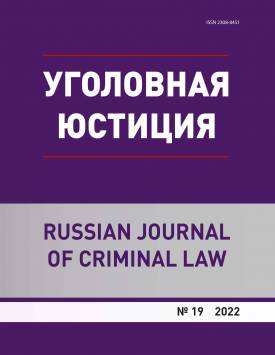On the legal content of the term “operational environment in the institutions of the penal enforcement system”
One of the important tasks of the Penal Enforcement System is to maintain law and order. The analysis of departmental statistics has indicated a negative trend in the growth of illegal actions in correctional institutions, which greatly complicates the enforcement process. The reasons for the complication of penalty execution include general misunderstanding and ignoring the system of organising factors that determine latent and (or) open signs of a deteriorated state of law and order. There are a number of objective and subjective reasons for that, including insufficient terminology. To date, there is no legislatively defined or scientifically substantiated concept denoting the boundaries of the proper level of functionality of penal institutions. However, the employees of the penal institutions use the term “operational environment” in their everyday communication to describe the activities of a correctional institution subject to negative phenomena and processes. Moreover, there is no clear system of criteria for evaluating the activities of penal institutions, which makes it necessary to determine such criteria for the standard activity of penal institutions. For the most part, the assessment indicators are subjective and expressed by various ratings of functioning, which, in turn, makes it difficult to determine the framework for an ideal model of a correctional institution and the factors that affect its stable work as well as various deviations from the standard. It is necessary to substantiate the terminology to determine the content and general understanding of which features will characterise the stable operation of a correctional institution. There were attempts to define “operational environment” in various scholarly and practical works by researchers and employees on the penal system and internal affairs bodies of the Russian Federation. However, there is still no clear interpretation. Based on scholarly works and practical experience, the authors propose their own definition of “operational environment in correctional institutions”, which should be understood as a set of objective and subjective phenomena and processes in penitentiary institutions and beyond, affecting their stable operation.
Keywords
institutions of Penal Enforcement System, operational environment, assessment criteriaAuthors
| Name | Organization | |
| Kiselev Mikhail V. | Tomsk Institute for Advanced Training of Employees of the Federal Penitentiary Service of Russia | mihail1973kiselev@yandex.ru |
| Shkurenko Ivan A. | Tomsk Institute for Advanced Training of Employees of the Federal Penitentiary Service of Russia | ivanc100to@yandex.ru |
References

On the legal content of the term “operational environment in the institutions of the penal enforcement system” | Ugolovnaya yustitsiya – Russian Journal of Criminal Law. 2022. № 19. DOI: 10.17223/23088451/19/10
